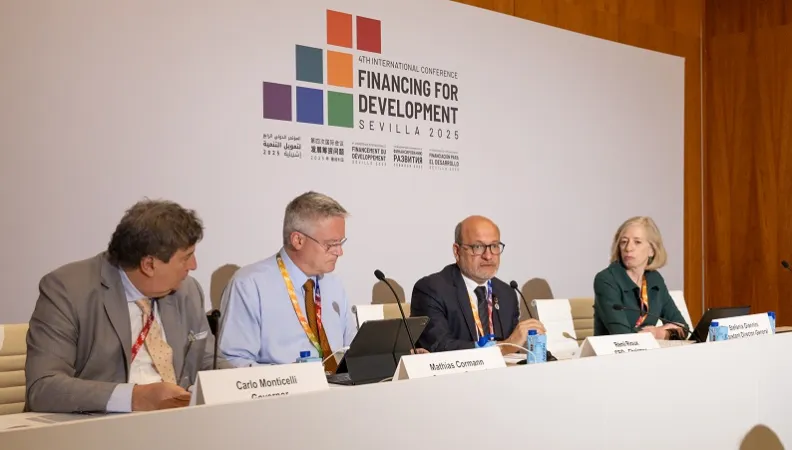Share the page
Concrete progress for public development banks at the UN conference in Seville
Published on

Held in Seville, Spain, from June 30 to July 3, the fourth International Conference on Financing for Development (FfD4) marked a major step forward in international finance, with public development banks top of the agenda.
Ten years on from the conference in Addis Ababa, Ethiopia, the adoption of the Sustainable Development Goals (SDGs) and the Paris Climate Agreement, development stakeholders met in Seville from June 30 to July 3 for the fourth United Nations Conference on Financing for Development (FfD4), with a remit to overhaul the architecture of development financing. The Seville Commitment, adopted by UN Member States on the first day of the conference, sets out a new roadmap for the sector.
Five years before the deadline for the SDGs expires, the goal is to raise the $4 trillion needed each year to finance sustainable development. This will require the mobilization of additional financing from countries' national resources, international public finance institutions, and private investors, while aligning existing financing systems more closely with the SDGs. To achieve this, the FfD4 summit focused on reforming international financial architecture to make it more equitable, representative, and transparent.
France has been a driving force behind this reform of development architecture. AFD Group has long been working to advance France's vision of inclusive and sustainable investment, which was endorsed in Seville: official development assistance should no longer be viewed as the primary source of financing but rather as a tool that, while still essential, should be used in combination with other financial flows.
Greater recognition for the role of public development banks
The Seville Commitment now fully recognizes the unique role of public development banks in connecting global goals to local priorities and mobilizing public and private financing for sustainable development. “The role of public development banks is now recognized in international financial architecture, with an integrated approach, not only in terms of national priorities such as poverty reduction and economic development, but also global issues like combating climate change and protecting biodiversity,” says Adama Mariko, Secretary-General of the Finance in Common (FiCS) network, which is made up of 530 public development banks.
The signatories of this text have called on countries with national development banks to “build the capacities of these institutions”, align their mandates with sustainable development goals, and “help countries that do not have development banks to establish these institutions.”
To achieve the overall goals of the Seville Commitment, public development banks must act as part of a system, as recommended by the FiCS network in a report presented at the conference: collaborate more seamlessly, pool their resources, increase their capital capacities, improve project preparation, and better leverage financing from the private sector.
Concrete initiatives launched in Seville
To achieve these objectives, FiCS, along with several of its partners, presented a series of concrete initiatives at the conference under the Seville Platform for Action, aimed at building the capacities of public development banks, facilitating their access to financing, and supporting national sustainable development strategies.
These initiatives include a Market Access and Guarantee Facility for public development banks. Around 100 of these banks currently borrow on capital markets, and the goal for 2030 is to double this figure, by increasing their solvency through reliable guarantees.
“Once a bank meets a certain number of criteria, it will be eligible for this guarantee which will make it easier to borrow on the markets,” explains Nicolas Picchiottino, Secretary General of IDFC (International Development Finance Club). This mechanism will help make sustainable development projects more attractive to private investors. It is scheduled to be deployed for the first time in late 2025.
Technical assistance catalogue
The publication of a digital technical assistance catalogue marks another important milestone. It provides the first structured inventory of the global services offered by technical support providers and aims to connect these companies with public development banks, thus amplifying their essential role in sustainable development financing. It currently lists 30 programs, with a target of 50 to be reached by the end of the year.
An initiative has been launched in partnership with TCX to reduce banks' exposure to currency risk, particularly in low-income countries. These funds—amounting to $2 billion, including $500 million specifically earmarked for public development banks—serve as a guarantee and can be used to supplement foreign currency loans, thus protecting these institutions against the risk of local currency fluctuations. This facility will be launched in 30 countries between now and November 2025, when COP30 is due to be held in Belém, Brazil.
Facilitating the implementation of integrated national strategies
The Global Financing Playbookwas also unveiled in Seville, which aims to remove barriers to investment for individual countries. “This playbook identifies all the tools available to countries via public development banks and UN agencies to launch a country platform or an Integrated National Financing Framework (INFF),” says Nicolas Picchiottino.
A country platform is a voluntary mechanism created by a government to manage cooperative projects between development partners and align climate and sustainable development financing with its national vision for a low-carbon economy and sustainable development, as well as any associated strategies. The goal is to ramp up the implementation of integrated national strategies and consolidate pathways between sustainable development policy and financing.
Many of the stakeholders at this fourth International Conference on Financing for Development hoped that this event would serve as a platform to address long-standing challenges and unlock new opportunities. Solid progress has certainly been made, and AFD Group and the FiCS will both play a major role in taking this work forward and implementing the Seville Commitment.
Rémy Rioux, CEO of AFD Group, speaks at the FfD4 conference in Seville (English subtitles available)
